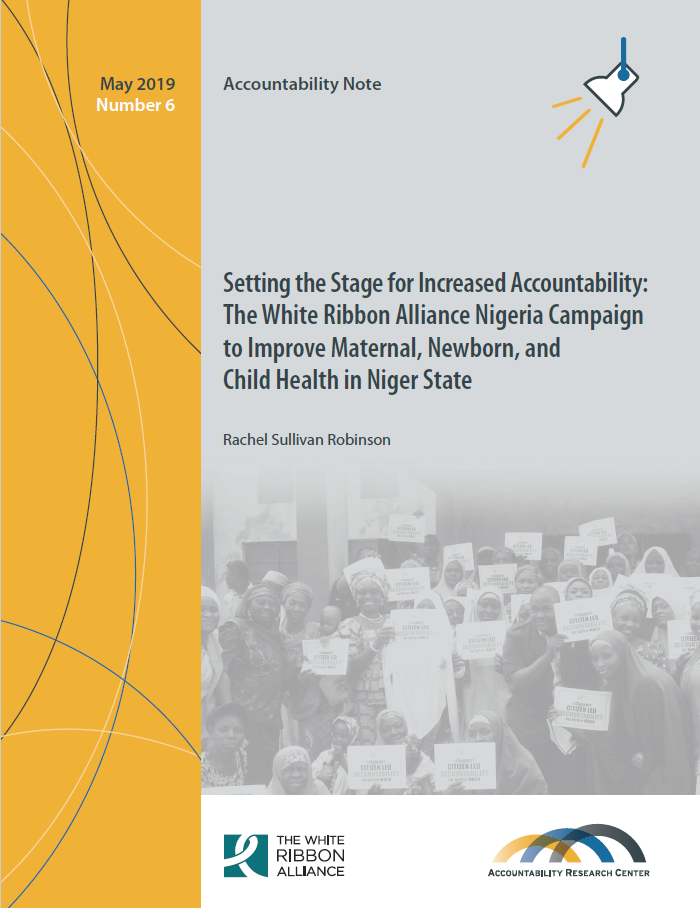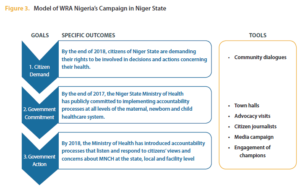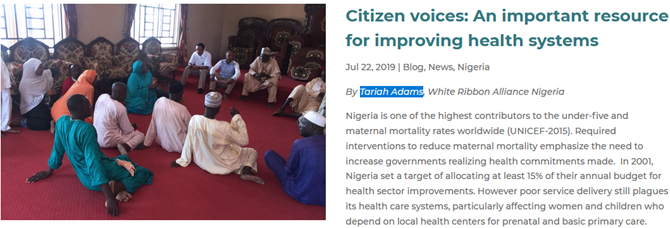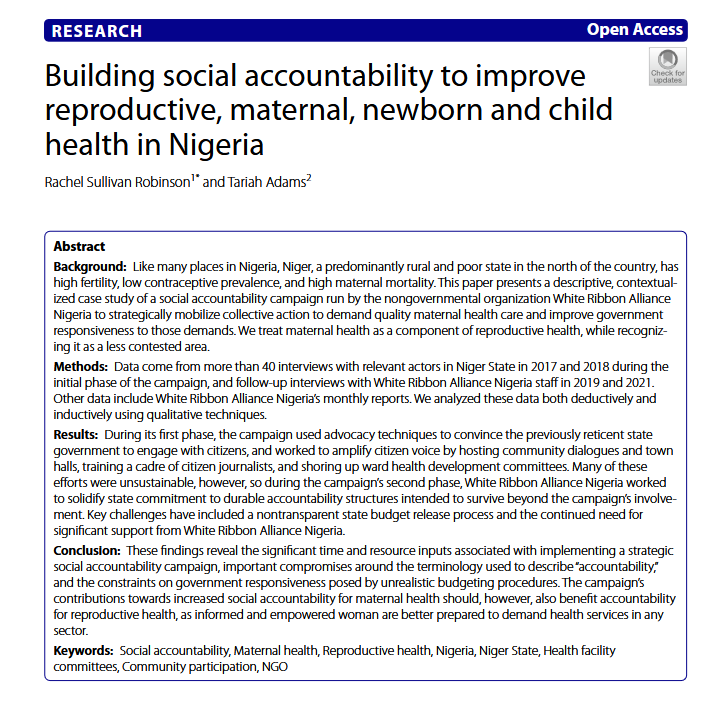
Setting the Stage for Increased Accountability: The White Ribbon Alliance Nigeria Campaign to Improve Maternal, Newborn, and Child Health in Niger State
Date: May 2019
Author(s): Rachel Sullivan Robinson
Publication type: Accountability Note
Published by: Accountability Research Center and White Ribbon Alliance
Most African governments have made extensive commitments to provide primary health care to their citizens; in many cases these commitments date from the post-independence era, but have been reinvigorated in response to the Millennium and Sustainable Development Goals. Yet poor service delivery plagues the health care systems of many African countries, in particular affecting women and children who depend on local health centers for prenatal and basic primary care. One route to improving such care is through holding government accountable for its health care promises. But in many of these contexts, democracy is fragile and civil society is weak, leaving few institutions for holding government to account. In these contexts, can external actors support such pro-accountability change? This accountability note begins to answer this question with reference to White Ribbon Alliance Nigeria’s campaign to improve maternal, newborn, and child health in Niger State. Campaign activities promoted citizen demand for quality maternal health care and government responsiveness to those demands through advocacy to key health system actors, community dialogues to share information and set strategy, town halls to bring together citizens and government representatives, and the training of a cadre of citizen journalists to expose poor quality health care as well as highlight government responsiveness to citizen demands. This note puts forward four lessons drawn from the campaign’s experiences:
- In contexts where both civil society and the state lack capacity, campaigns that simultaneously engage government and enable citizens to voice their opinions can increase state government participation in activities that increase accountability.
- Compromise over the meaning of “accountability” can both facilitate and constrain progress towards accountability.
- Where citizens desire more from government and are willing to demand services, campaigns can facilitate events where citizens learn about their rights, devise strategies for achieving them, and engage with government representatives.
- Where citizens are willing and able to challenge government, campaigns can train citizen journalists to report on accountability failures.
The analysis is based on more than 40 interviews conducted in 2017 and 2018 with relevant actors in Niger State as well as a review of campaign and government documents. Although an impact of the campaign on health care utilization is not yet visible, the campaign has convinced the previously reticent state government to engage with citizens, and anecdotal evidence suggests improvements to health care facilities in response to town halls and citizen journalist reports. The government has also invited White Ribbon Alliance Nigeria to train all of the state’s local health committees responsible for oversight of primary health care facilities, demonstrating how collaboration has created a pathway towards greater accountability. Taken together, these findings support the proposition that external actors can play a vital role in supporting and magnifying citizen demands for better health care while simultaneously enabling government responsiveness to those demands, thus laying the groundwork for greater accountability.

Rachel Sullivan Robinson Rachel Sullivan Robinson, Associate Professor in the School of International Service at American University and a Faculty Collaborator with the Accountability Research Center, studies global health interventions and the NGOs that implement them in sub-Saharan Africa. She has worked in Nigeria since 2006, focusing on a variety of topics including family planning, HIV/AIDS, sexuality education, and LGBTQ populations. She is the author of Intimate Interventions in Global Health: Family Planning and HIV Prevention in Sub-Saharan Africa (Cambridge University Press, 2017), as well as articles in journals such as Demography, Sociology of Development, and World Development. The MacArthur Foundation, the Council of American Overseas Research Centers, and the National Science Foundation have funded her research. She teaches courses on statistics, population studies, global health, NGOs, and development, and holds a PhD in sociology and demography from the University of California, Berkeley.



